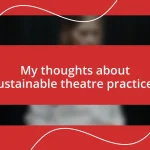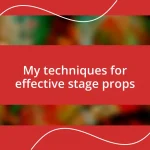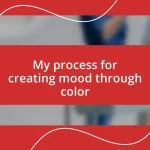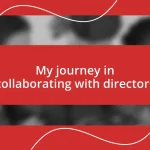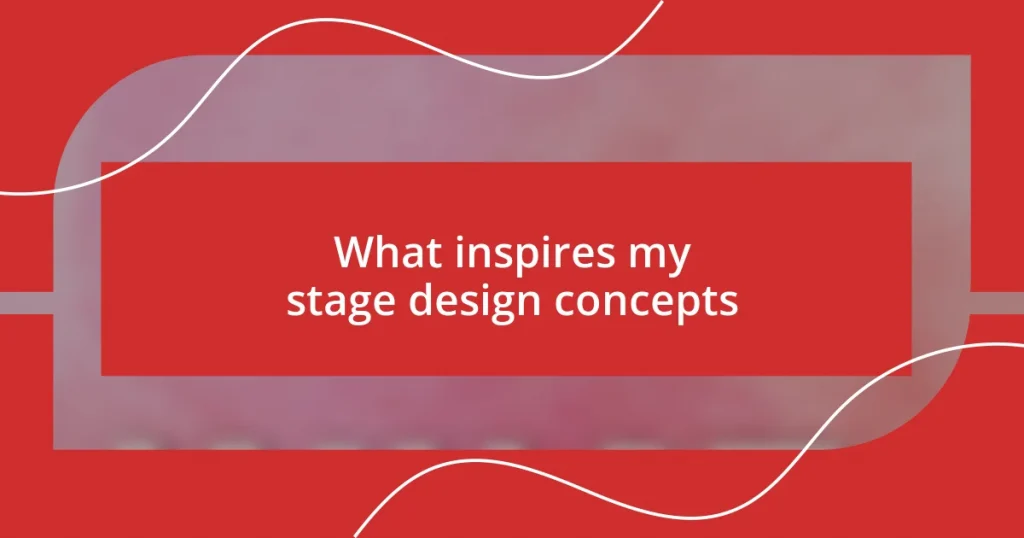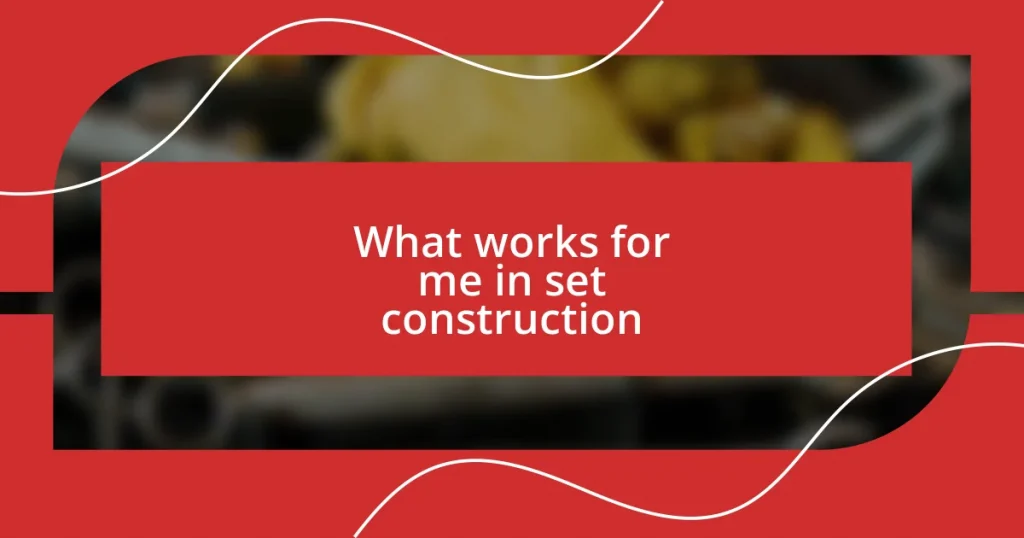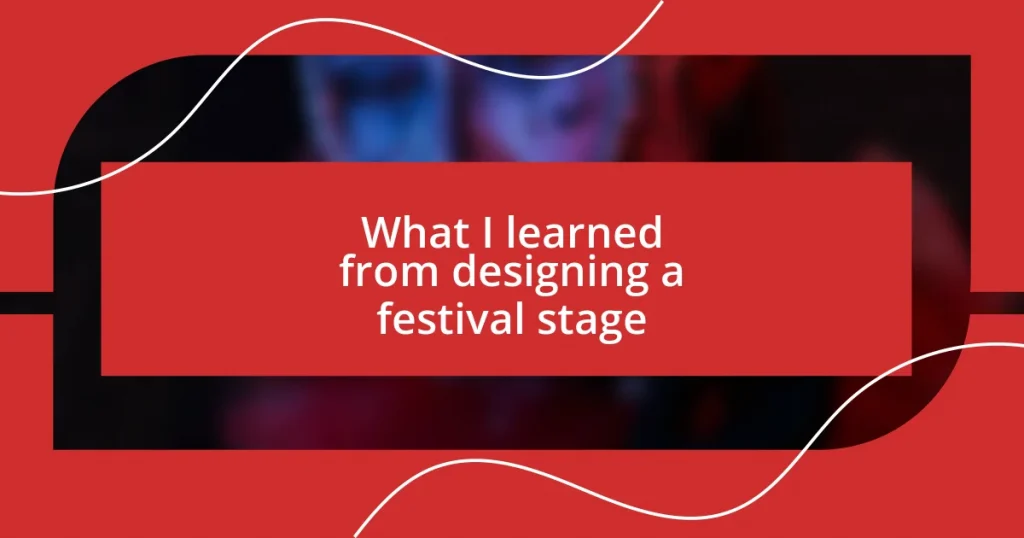Key takeaways:
- Preparation involves personal connection to the material and authentic self-expression, not just memorization.
- Constructive feedback is essential for growth; embracing it leads to improved performances and greater resilience.
- Building confidence in auditions comes from experience, vulnerability, and learning from past performances to enhance future efforts.
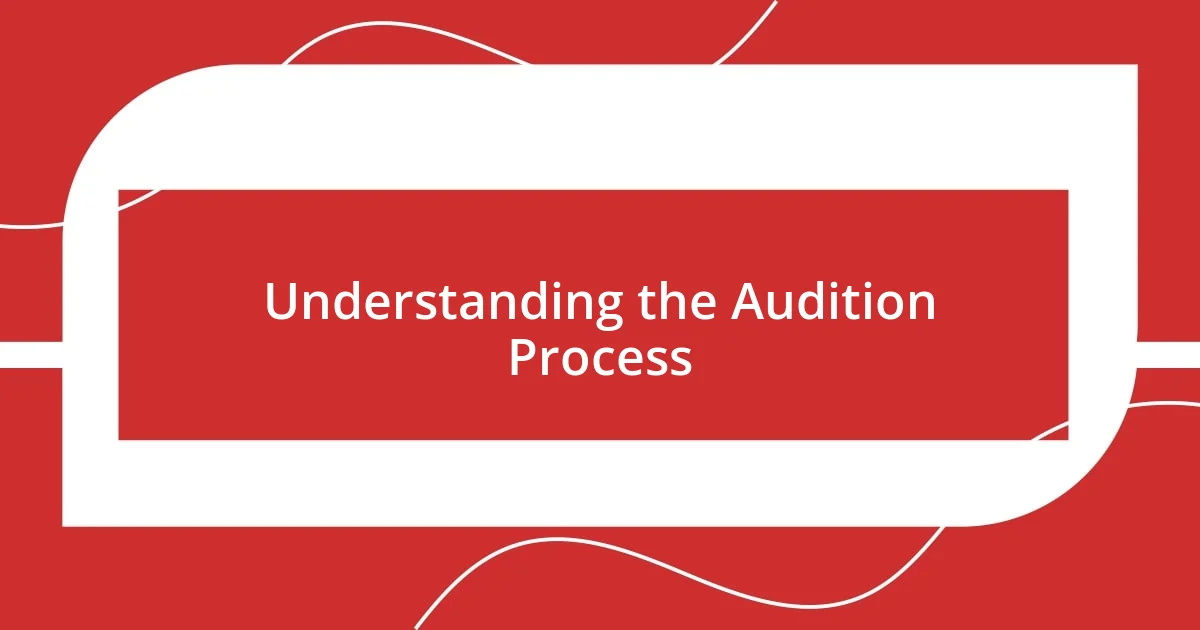
Understanding the Audition Process
When I first stepped into an audition room, I was overwhelmed by the energy—the mix of excitement and nervousness was palpable. Each audition is like a mini performance; you have a limited time to showcase who you are and what you can bring to the table. Have you ever felt pressure to impress when everyone’s eyes are on you? I’ve learned that understanding this atmosphere can help you channel your nerves into a captivating presence.
Delving deeper into the audition process, I discovered that preparation isn’t just about memorizing lines. It’s about connecting with the material on a personal level. In my early auditions, I focused too much on delivering the perfect performance, but I realized that showing my authentic self could resonate more with the panel. Isn’t it fascinating how vulnerability can often be your greatest strength in such moments?
Furthermore, the feedback you receive post-audition can be invaluable. I remember a particularly rough call-back where the feedback stung a bit, but it ultimately guided my growth. Have you ever had a critique that felt harsh at first but led to significant improvements? Embracing constructive criticism is a key part of understanding the audition process, as it allows for reflection and development in an often competitive environment.
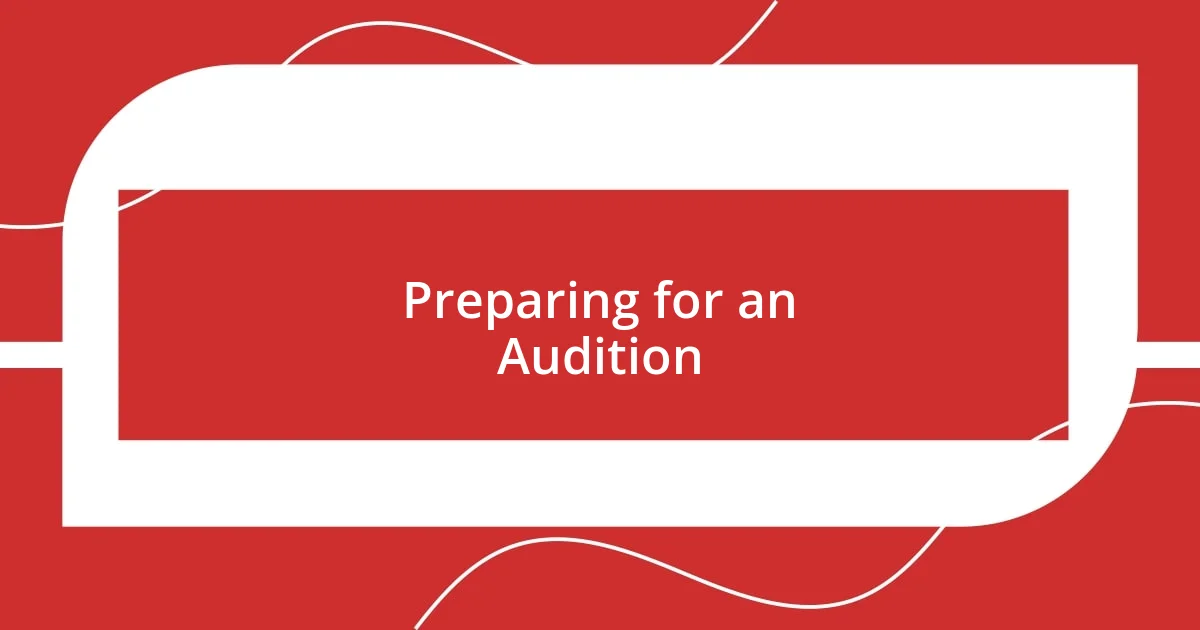
Preparing for an Audition
Preparing for an audition can feel like gearing up for a big game. The stakes are high, and I often find myself reflecting on how I can elevate my performance. I remember one time, just before stepping into a particularly nerve-racking audition, I took a moment to close my eyes and visualize myself succeeding. That mental preparation shifted my mindset and helped calm my nerves, reminding me that I had something unique to offer.
Here are some essential steps I’ve found helpful in preparing for an audition:
- Choose the Right Material: Select pieces that resonate with you personally; they’ll naturally shine through in your performance.
- Practice, Practice, Practice: Rehearsing isn’t just about saying the lines; it’s about owning them and finding your personal interpretation.
- Know Your Audience: Research the casting directors or production team to understand what they might be looking for.
- Warm Up Physically and Vocally: Treat your body and voice like an athlete would before a competition—this sets the stage for your performance.
- Prepare for the Unexpected: Auditions can be unpredictable, so embrace the unknown and stay adaptable—your confidence will reflect that.
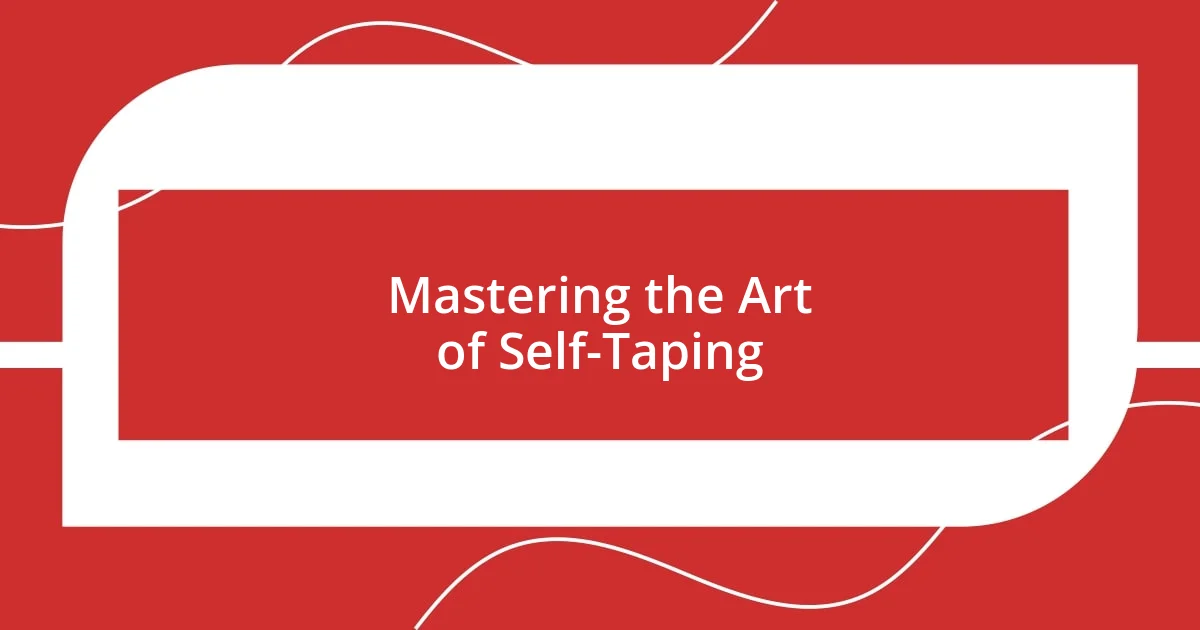
Mastering the Art of Self-Taping
Given my experience with self-taping, I’ve found it to be a blend of creativity and technical know-how. There was a point where I recorded my first self-tape, and honestly, I felt like I was filming a mini movie. The thrill of controlling the environment, from lighting to camera angles, was exhilarating. However, it was also a challenge; I had to be my own director and actor simultaneously. Have you ever tried to create a character through a lens? I’ve learned that steady framing and good lighting can transform a simple recording into a captivating audition piece.
One key insight I picked up along the way was the importance of an engaging background. I remember a particularly chaotic self-tape where my living room looked like a post-apocalyptic mess! The concentration I needed was overshadowed by clutter. So, I learned to curate a clean, simple backdrop that wouldn’t distract from my performance. Not only does a tidy scene enhance professionalism, but it also allows the viewer to focus solely on the performance. Isn’t it amazing how details can make such a significant difference?
As I continued to practice self-taping, I started to explore the nuances of delivery and timing. I recall one specific audition where I emphasized a moment just a beat longer than usual. The effect was astonishing—like a spark that ignited the entire scene. I realized the power of pacing and pauses in storytelling, which can sometimes speak louder than words alone. Have you ever noticed how a pause can build anticipation? Understanding this not only helped me in self-taping but also enriched my overall acting craft.
| Aspect | Self-Taping | In-Person Auditions |
|---|---|---|
| Environment Control | Complete control over lighting and sound | Dependent on venue conditions |
| Feedback Opportunity | Review and adjust before submission | Immediate but unpredictable |
| Direction | Self-directed performance | Guided by directors and casting agents |
| Convenience | Record anytime, anywhere | Set schedule and location constraints |
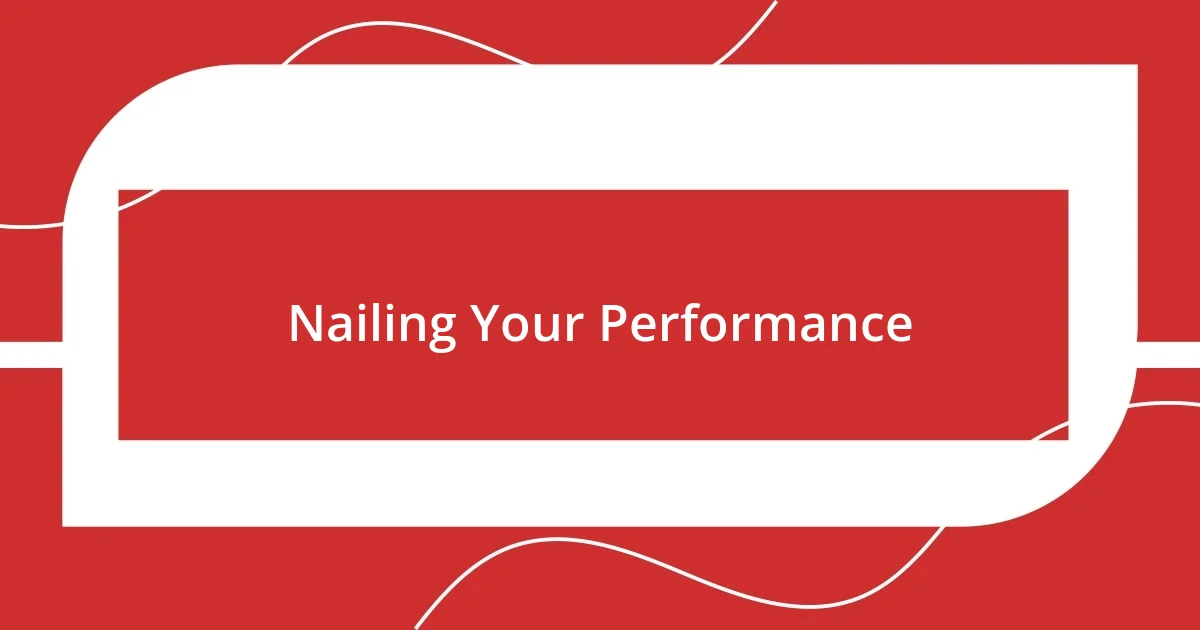
Nailing Your Performance
When it comes to nailing your performance, presence is everything. I vividly remember my first live audition where I felt the energy of the room—the audience and casting team were all there, and I was determined to leave a mark. Taking a deep breath, I projected my voice and body language to fill the space, which instantly shifted my nerves into excitement. Have you ever felt that rush of adrenaline? It’s exhilarating! That moment taught me how vital it is to own the physical space around you.
Another lesson learned was the importance of emotional connection. During one audition, I tapped into a personal experience—a bittersweet memory about saying goodbye. I could almost feel the weight of that emotional truth, and it resonated in my performance. The casting team’s reactions, seeing their eyes widen with understanding, reinforced how authenticity could elevate a piece. Isn’t it fascinating how our personal stories can become powerful tools on stage?
Finally, I realized that vulnerability plays a huge role in a captivating performance. I recall a time when I stumbled over a line, but instead of panicking, I embraced it. Instead of masking my mistake, I allowed my character to react naturally; it was messy but real. When I caught the director’s eye, we shared a laugh that transformed the moment, turning a potential blunder into a memorable connection. Have you ever thought about how those imperfections can truly humanize your performance? Embracing vulnerability allowed me to connect with my character and the audience in ways that polished perfection never could.
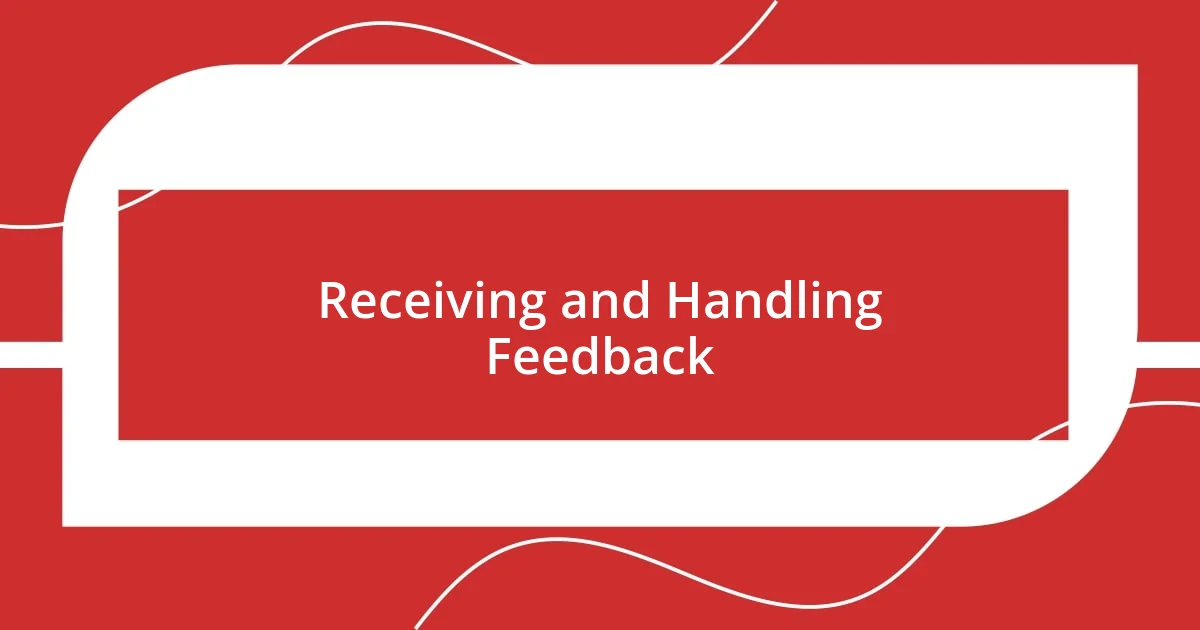
Receiving and Handling Feedback
Receiving feedback can be a double-edged sword, yet I’ve come to embrace it as a vital part of my journey. I remember one specific audition where I was eager to hear the director’s thoughts. Their feedback felt tough to hear at first, but reflecting on it later, I realized they were guiding me toward growth. Have you ever felt that sting of critique? It can be painful, but I’ve learned that it’s merely a stepping stone to improvement.
Handling feedback effectively involves more than just listening; it requires processing and applying what you’ve learned. After a recent audition, I received constructive criticism about my emotional range. Initially, I felt defensive, but instead of shutting myself off, I chose to dive deeper. That experience taught me that feedback is an opportunity for learning, not just a judgment on my abilities. Do you find it easier to absorb feedback from trusted sources? I do, and I make it a point to seek those insights.
Incorporating feedback into your routine can enhance your craft tremendously. I started recording rehearsals and comparing them to my auditions, using comments I’d received to pinpoint areas of improvement. When I began implementing these changes, I noticed a significant difference in my performances. It’s fascinating how feedback not only shapes your skills but can also lead to unexpected breakthroughs. What changes have you made based on feedback? For me, those shifts have been transformative.
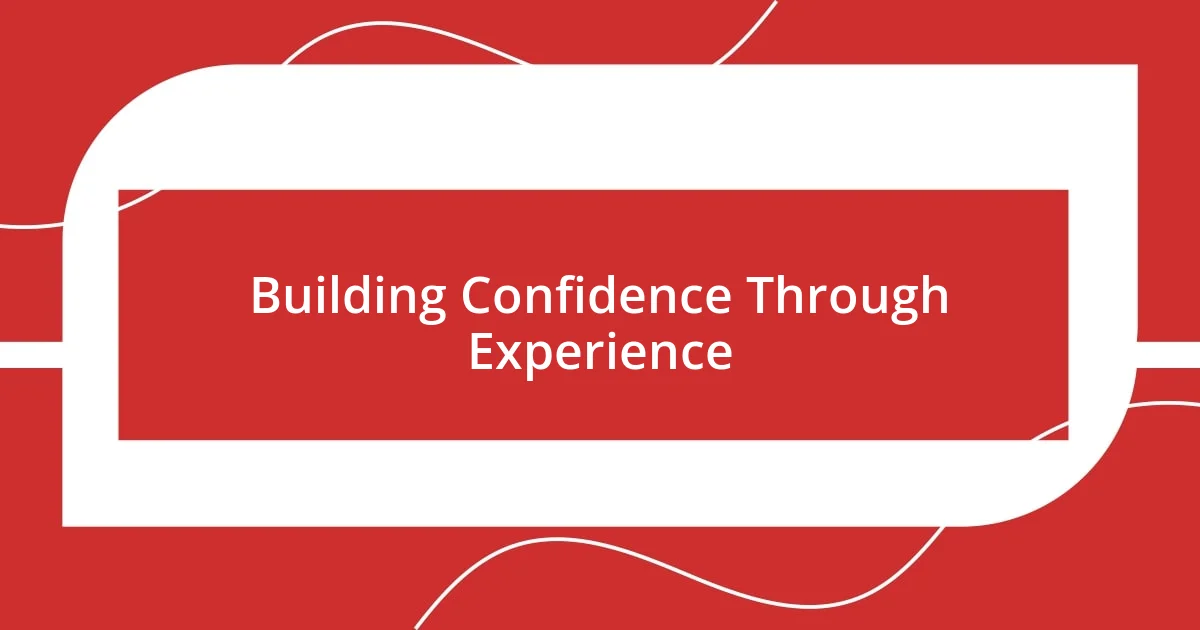
Building Confidence Through Experience
Building confidence through experience has been one of the most rewarding aspects of my journey in auditioning. I remember stepping into a room filled with seasoned professionals, my heart racing. I thought, “How do I belong here?” But as I performed, I noticed the other actors smiling and nodding, a subtle acknowledgment that we were all in this together. That shared understanding built my confidence and reminded me that every audition is a cooperative experience, not just a personal trial.
One audition stands out in my mind, where I felt particularly insecure about my choices. The moment I stepped on stage, I made a conscious decision to focus on my breath and settle into my character, allowing the rhythm of the lines to flow naturally. I could feel the transformation—my nerves turned into a grounded presence. It was like flipping a switch: the more I engaged with the material, the less I thought about my fears. Have you ever discovered strength in allowing yourself to fully inhabit a moment? That experience reaffirmed how powerful it can be to trust oneself through practice and presence.
With every audition, I’ve been reminded that confidence is cumulative. It’s built on those small victories and the courage to show up, even when I was striving for perfection. There was a time when I ignored opportunities out of fear of failing, but with each experience I embraced, I found a valuable lesson tucked into the challenge. It’s fascinating to witness how each audition, whether successful or not, contributes to a growing sense of self-assurance. What accomplishments are you proud of that have helped you build your own confidence? For me, each moment on stage has woven into the fabric of a more resilient, confident performer.

Applying Lessons to Future Auditions
Applying lessons from past auditions is like creating my own personal toolkit for future performances. After one challenging audition, I made a commitment to study other actors’ techniques that resonated with me. I remember watching a playback of my performance and feeling a mix of disappointment and resolve. It drove me to analyze what worked and what didn’t—not just in my own performance but in how others approached theirs. Have you ever found inspiration by observing someone else’s journey? This shift in perspective has helped me build a clearer vision for my growth.
From each audition, I’ve learned specific strategies that I can carry forward. For instance, I started to visualize my performance space before I even arrive, which helps ground my nerves. One time, I got so caught up in memorizing lines that I forgot about the energy of the room. Practicing visualization transformed that experience, allowing me to blend my preparation with spontaneity. I often ask myself—how can I infuse new energy into my familiar lines? This practice not only enhances my delivery but also keeps each audition feeling fresh and exciting.
Every setback can indeed be a stepping stone. In my last audition, I faced the uncomfortable reality of being turned down again. Instead of letting that defeat weigh me down, I reflected on what I could adjust in my approach. It struck me that each rejection was an invitation—to reassess, to refine, and to try again. Have you ever felt stuck by a setback? For me, embracing this mindset has transformed my outlook, making each future audition not a test of worth but a chance to grow and shine in new ways.




